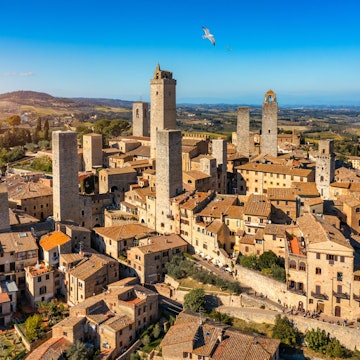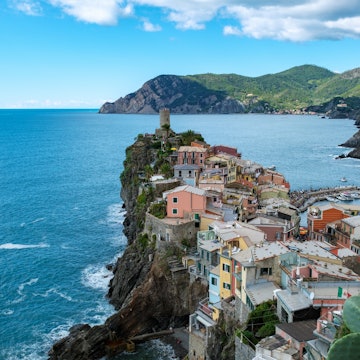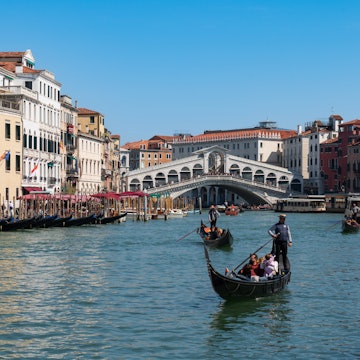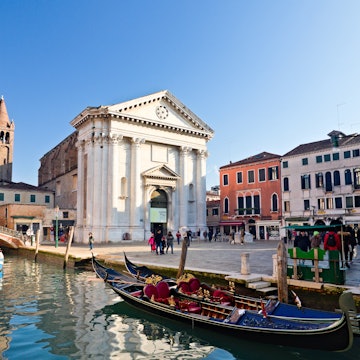
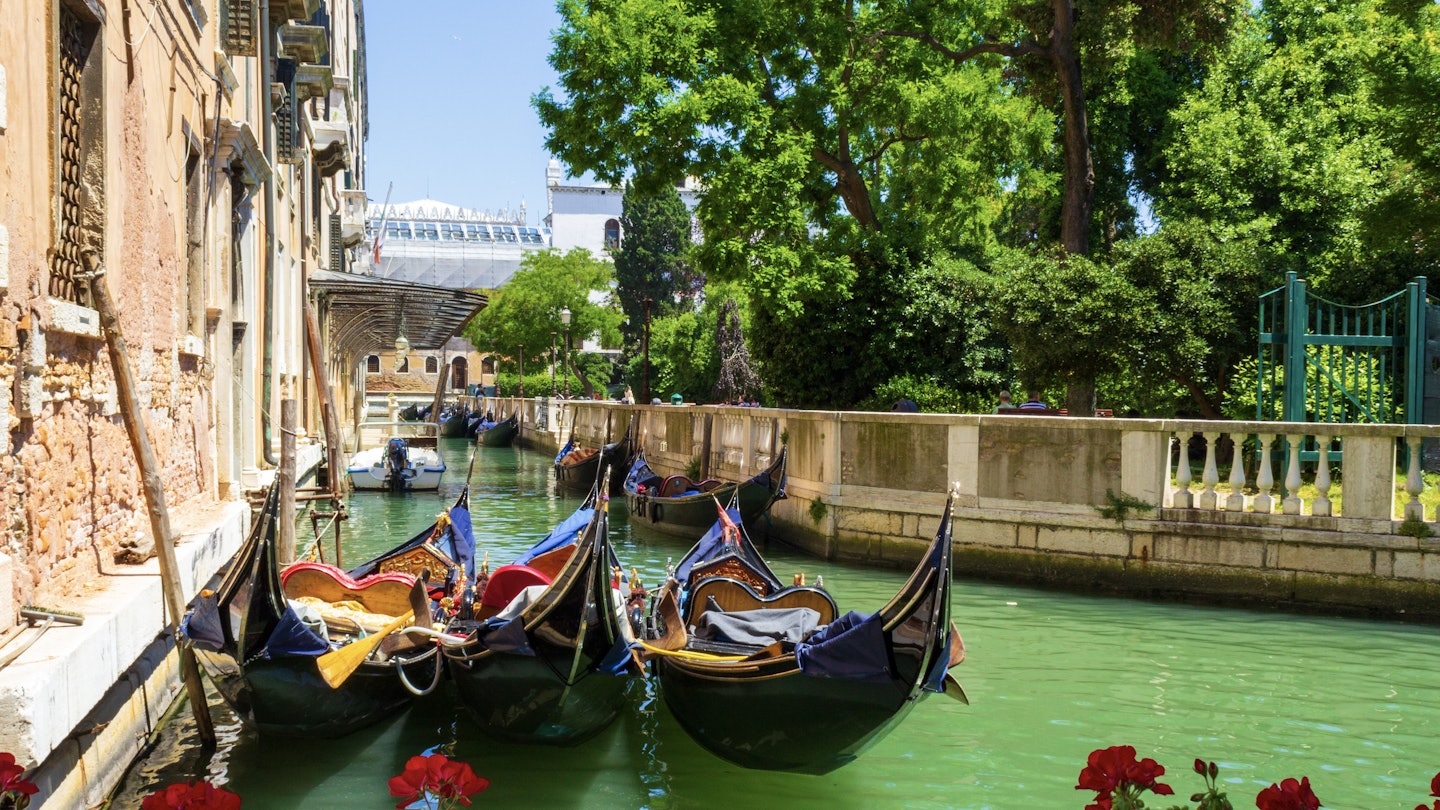
Gondolas in the canal that forms one side of the Giardini Reali, Venice. Anna Yordanova/Shutterstock
Gothic palaces, Byzantine basilicas, gliding gondolas and tangled alleys: sui generis Venice is renowned for many things. Great swathes of green aren’t among them.
Yet among all the stone and water you’ll find a series of tranquil sanctuaries – if you know where to look, that is. Some are cloistered behind weathered walls, others hide in plain sight – and all offer welcome respite from the Serenissima’s relentless tides of smitten admirers. Which is your retreat of choice: a royal garden, a secret monastic hideaway or a sculpture-packed courtyard?
Here are seven parks in Venice where you can find your Zen.

1. Parco Savorgnan
Best for unwinding among locals
Not far from Venice’s Santa Lucia train station, Parco Savorgnan plays it sly, tucked behind Cannaregio’s old palazzi and missed by most tourists. Its main entrance – a pair of easy-to-miss green gates on Fondamenta Venier – sits just steps from the bustle of Ponte delle Guglie. Slip through, and you’re in Cannaregio’s leafy backyard: a shady, rambling hideout that dates back to the 17th century.
It’s a handy pit stop on the trek from the station to Rialto or San Marco, and a front-row seat to everyday Venetian life: nonni walking their chihuahuas, locals working up a sweat on the outdoor gym gear, teens sprawled on benches deep in their DMs. Bring a book, find a perch – and delightfully lower the pace of a busy day of sightseeing.
2. Giardino del Convento
Best for monastic-style contemplation
Older still is Giardino del Convento on Giudecca, hidden behind Andrea Palladio’s magnificent Chiesa del Santissimo Redentore. Off-limits to all but its resident Capuchin friars and their guests for half a millennium, it finally opened to the public in 2024 after a loving restoration by the Venice Gardens Foundation.
Entry is through an unmarked door in the wall to the left of the church. A ticket is required – but it’s worth every cent to wander the cross-shaped garden’s soulful sweep of grapevines, fruit trees, vegetables and medicinal herbs, all waiting beyond the hush of a silvery olive grove and cloister.
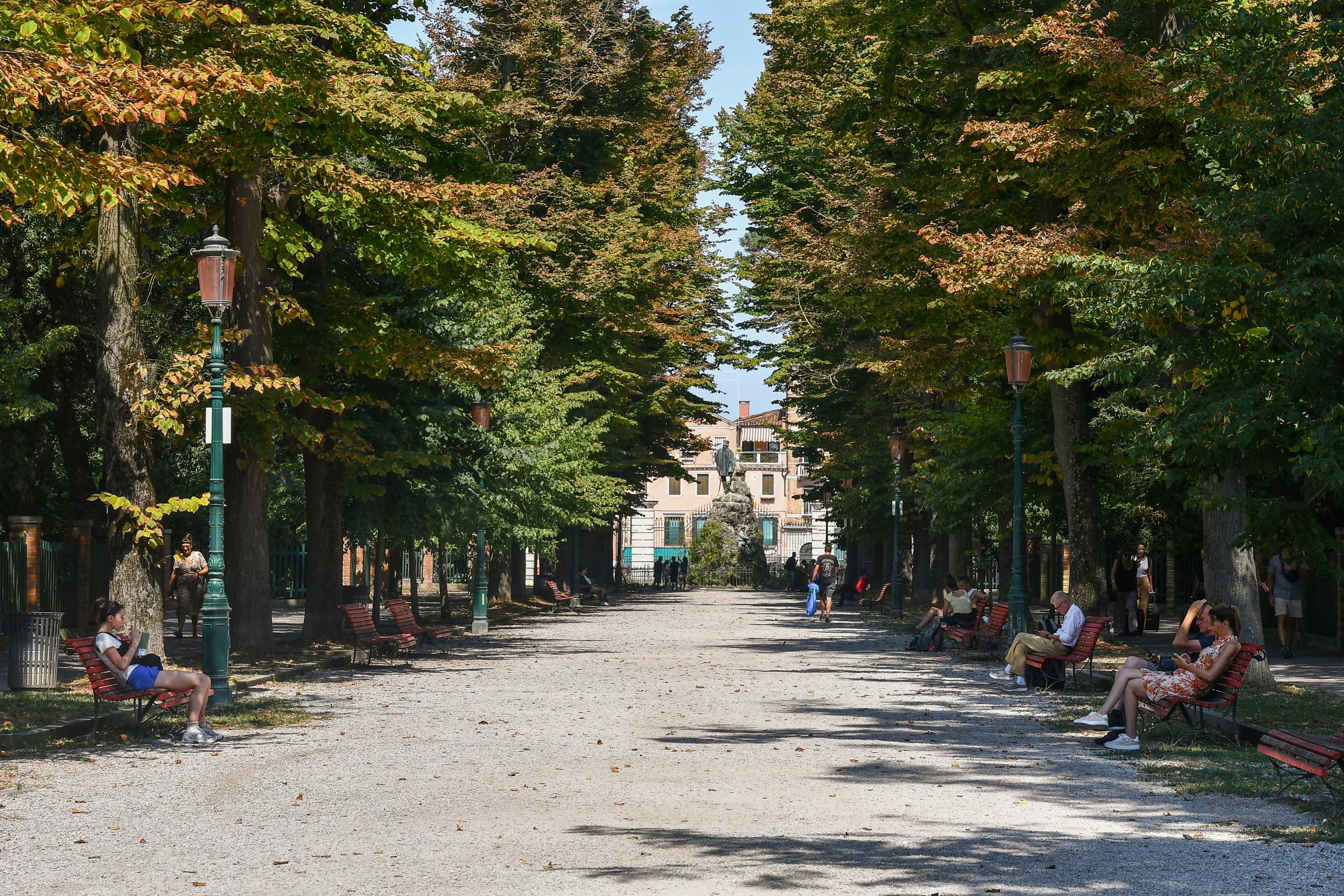
3. Giardini Napoleonici
Best for a Parisian-style promenade
Don’t be surprised if your thoughts wander to Paris while ambling through Castello’s Giardini Napoleonici: for they were laid out on the orders of Venice’s former ruler, the French Emperor Napoleon. At their heart is a wide, tree-lined promenade that cuts through the gardens, linking Via Garibaldi – the city’s broadest street – with the Giardini della Biennale, ground zero for Venice’s world-famous art and architecture exhibitions. The scene feels lifted from a Madeleine picture book, with its turtle-filled pond, cooling canopy and neat rows of peeling park benches. Watch residents on their daily passeggiata (stroll), or kick back at Caffè La Serra, its sun-shaded tables flanked by a belle-époque greenhouse.

4. Parco delle Rimembranze
Best for a shady respite
Also known as the Pineta di Sant’Elena, this vast pine grove spreads across the island of Sant’Elena, just a bridge away from the Biennale pavilions. Hugging the waterfront, the park is shaded by deep-green umbrella pines, each planted in memory of a fallen WWI soldier. There’s a small playground for kids, but plenty of quiet corners too – perfect for catching your breath between art marathons or losing yourself in the dreamy view across the Bacino di San Marco, Venice’s bell towers and domes piercing the horizon. This, too, is an ideal spot to observe Venetians, from lovestruck millennials to wistful pensionati (pensioners).

5. Giardini Reali
Best for a break from the crowds of Piazza San Marco
Every Italian city that once crowned dukes or kings has its Royal Gardens – and Venice is no exception. The Serenissima’s manicured Giardini Reali sit a stone’s throw from the crowds of Piazza San Marco and its world-famous basilica, yet couldn’t feel farther away. Here, bustle makes way for birdsong as trickles of visitors wander among potted pomegranates, wisteria-draped pergolas and resting gondolas.
Commissioned by Napoleon and finished by the Austrians, these elegant plantings once soothed imperial nerves. Today, after a thorough restoration by the Venice Gardens Foundation, they’re back in polished form – ready for a quiet stroll or a sharp espresso at the pavilion cafe. Water bottle empty? Refill it at the garden’s lion-head fountain.

6. Nasher Sculpture Garden at the Peggy Guggenheim Collection
Best for greenery with a side of art
Chagall, Ernst, Picasso, Pollock, Rothko: the sublime Peggy Guggenheim Collection is a must-visit for any aficionado of modern art. While many masterpieces hang indoors, others intrigue in the museum’s Nasher Sculpture Garden. Here, Mario Merz’s blue neon slices through ivy, while sculptures by Henry Moore, Alberto Giacometti, Yoko Ono and Isamu Noguchi encourage reflection amid manicured plantings, paths and quiet, shady nooks.
The palazzo was once home to American heiress and art collector Peggy Guggenheim, who today rests in peace in the garden, beside her beloved Lhasa apso dogs. In this sophisticated and charming enclave (museum admission required), you can muse on life, people-watch or retreat to the civilized garden café for a light lunch or well-made cappuccino.
7. Parco San Giuliano
Best for a leafy break on the mainland
Most people picture only the part of Venice that floats on the Lagoon – but the mainland is just a causeway away, and very much part of the greater city. So if you’re intrigued by a big-sky location beyond the usual city-center routes, carve out a few hours for Parco San Giuliano in Mestre, the last stop before the bridge to Venice proper. Spanning 183 acres, this ecological park was designed first and foremost for flora and fauna – but there’s plenty of room for skating, cycling, football – and taking a breather away from the selfie-snapping hordes.
Take your Italy trip with Lonely Planet Journeys
Time to book that trip to Italy
Lonely Planet Journeys takes you there with fully customizable trips to top destinations–all crafted by our local experts.




















